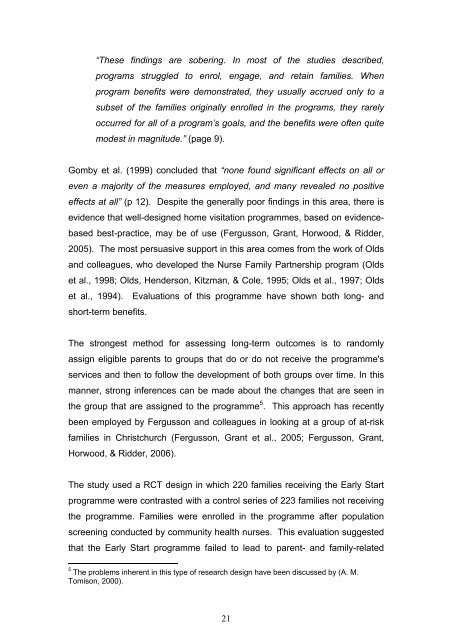Evaluation of Family Help Trust - New Zealand Family Violence ...
Evaluation of Family Help Trust - New Zealand Family Violence ...
Evaluation of Family Help Trust - New Zealand Family Violence ...
You also want an ePaper? Increase the reach of your titles
YUMPU automatically turns print PDFs into web optimized ePapers that Google loves.
“These findings are sobering. In most <strong>of</strong> the studies described,programs struggled to enrol, engage, and retain families. Whenprogram benefits were demonstrated, they usually accrued only to asubset <strong>of</strong> the families originally enrolled in the programs, they rarelyoccurred for all <strong>of</strong> a program’s goals, and the benefits were <strong>of</strong>ten quitemodest in magnitude.” (page 9).Gomby et al. (1999) concluded that “none found significant effects on all oreven a majority <strong>of</strong> the measures employed, and many revealed no positiveeffects at all” (p 12). Despite the generally poor findings in this area, there isevidence that well-designed home visitation programmes, based on evidencebasedbest-practice, may be <strong>of</strong> use (Fergusson, Grant, Horwood, & Ridder,2005). The most persuasive support in this area comes from the work <strong>of</strong> Oldsand colleagues, who developed the Nurse <strong>Family</strong> Partnership program (Oldset al., 1998; Olds, Henderson, Kitzman, & Cole, 1995; Olds et al., 1997; Oldset al., 1994). <strong>Evaluation</strong>s <strong>of</strong> this programme have shown both long- andshort-term benefits.The strongest method for assessing long-term outcomes is to randomlyassign eligible parents to groups that do or do not receive the programme'sservices and then to follow the development <strong>of</strong> both groups over time. In thismanner, strong inferences can be made about the changes that are seen inthe group that are assigned to the programme 5 . This approach has recentlybeen employed by Fergusson and colleagues in looking at a group <strong>of</strong> at-riskfamilies in Christchurch (Fergusson, Grant et al., 2005; Fergusson, Grant,Horwood, & Ridder, 2006).The study used a RCT design in which 220 families receiving the Early Startprogramme were contrasted with a control series <strong>of</strong> 223 families not receivingthe programme. Families were enrolled in the programme after populationscreening conducted by community health nurses. This evaluation suggestedthat the Early Start programme failed to lead to parent- and family-related5 The problems inherent in this type <strong>of</strong> research design have been discussed by (A. M.Tomison, 2000).21












